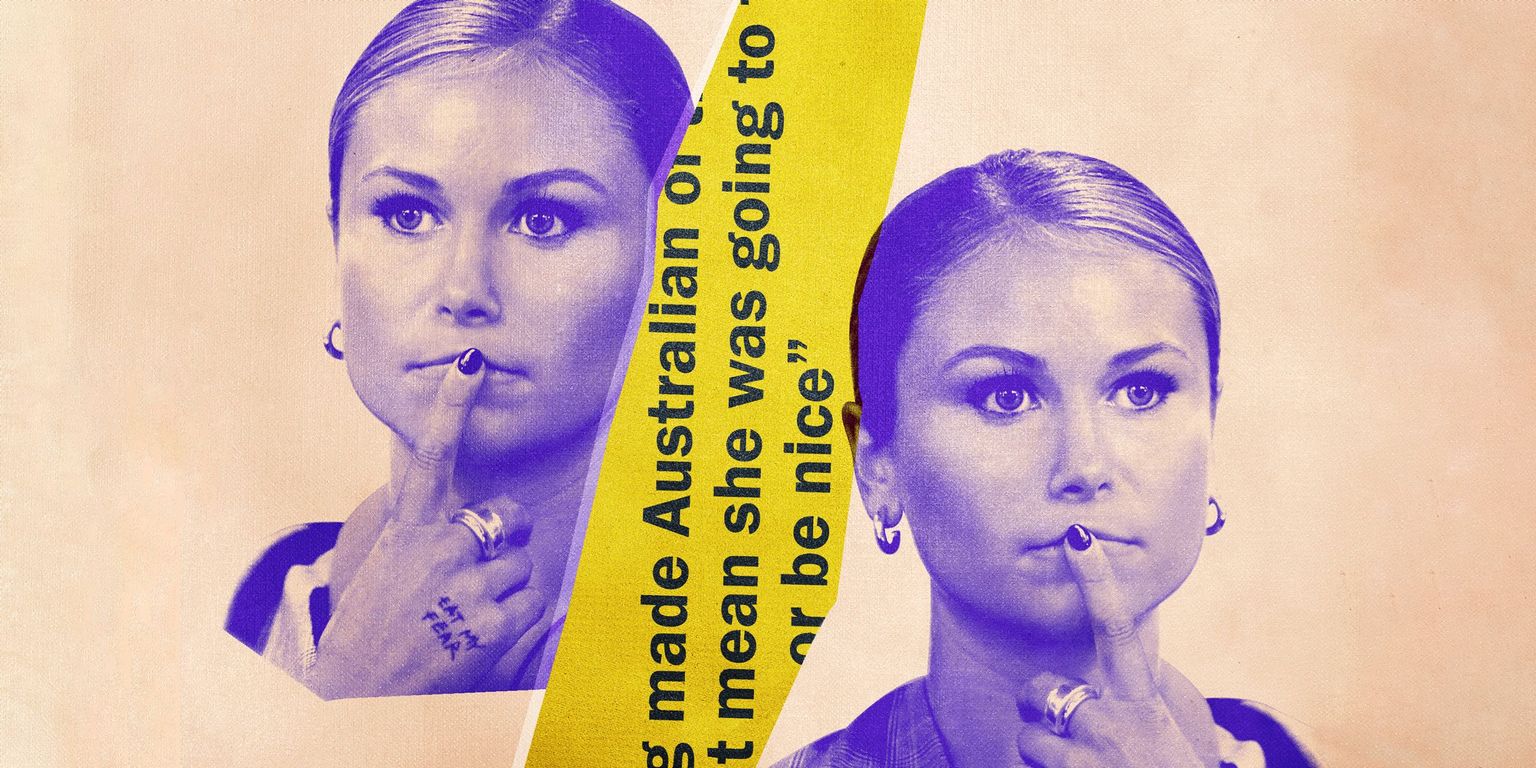How to lose friends and influence people
Has Grace Tame’s refusal to bargain with power changed the rules around public advocacy in Australia?

Photo illustration: Emily Thiang/AAP Photos
When an unnamed person phoned Grace Tame to say they would withdraw funding for her new foundation if she didn’t stop criticising the government, they were only doing what those on the inside have done for aeons: using threats or trinkets to control troublemaking outsiders.
A lesser activist may have capitulated. But Tame, the very epitome of a troublemaking outsider, turned the threat into a weapon. Addressing the Adelaide Writers’ Festival this March, the former Australian of the Year added further detail to the story she first shared at the National Press Club in February, in which she said she had received a “threatening phone call” from a “senior member of a government-funded organisation” who heavily leant on her to start behaving, or else.
The irony, as Imogen Champange noted at Crikey, was that Tame’s foundation exists primarily to educate people about the tactics and language abusers often employ to get their way. It should hardly have come as a surprise, then, that Tame would see the caller’s standover tactics for what they were. Tame had stood up to her own abuser as a teenager, an act she describes as having killed any fear she might have had about “upsetting the applecart”. True to her word, she has not for a second shied away from doing just that.
The anonymous phone call obviously didn’t succeed in keeping Tame quiet. Nor did it reflect well on the government, shining a spotlight on the way power and influence are often wielded in Australia. But Tame’s response to the threat raised an interesting question about advocacy. Namely: do you need to play nice to get your way?
For as long advocacy has existed, the conventional wisdom has dictated that you stand a greater chance of success as an insider, working within the very system you seek to change. This almost always means tempering any criticism of the politicians and government agencies that control funding; saying the right things in the halls of power and public. Put simply, you catch more flies with honey—a truism familiar to anyone who has to navigate power structures to do their work (i.e. everyone, everywhere).
Based on the available evidence though, it does not seem to be an adage Tame has ever given much credence to. Long before she ended her tenure as Australian of the Year, a conversation had begun about the way the Tasmanian had used the role as a battering ram for change. Some criticising her from the pages of News Corp were already arguing she had undermined her cause by being too forthright (though it’s clear they spoke more out of concern for her targets than for her mission), while over at Nine Tame was compared unfavourably with 2015 Australian of the Year Rosie Batty, who had taken a more conciliatory approach in the role, even when the government was often only paying lip service to her issues. (“She has to call it as she sees it,” Batty said of Tame. “But I haven’t felt comfortable sometimes.”) The conversation kicked into overdrive after Tame refused to smile beside the PM, with critics writing that she was winning herself no friends, and fans praising her for refusing to defer to a man who repeatedly disrespected her cause.
Tame's approach appears to have shifted the story about how an advocate, not least an Australian of the Year, should pursue change.
The question on every pundit’s lips was whether speaking out and making herself an antagonist of the government (often to the point of trolling Morrison on Twitter) meant that Tame would receive less support. The answer, if that phone call was anything to go by, was a resounding yes: you receive more assistance by playing ball, and might have your funding withdrawn if you don’t.
But perhaps the more important question to ask was whether this actually matters. Tame’s defenders have claimed that by rattling the cage, she was able to secure more media coverage for her foundation, and spark an important national discussion about the way women and survivors of sexual assault are often forced to comport themselves for the sake of “civility”.
For decades, advocates for all sorts of issues have worked within the system, often compromising their narratives and holding their tongues in an attempt to make change while ensuring ongoing access to government funding and support. In some cases, this has worked well. In others, the support it has secured has been inadequate and tokenistic.
As journalist Jane Gilmore wrote in a piece that seemed to voice what many were thinking, working from the inside often necessitates toeing a line that’s ultimately detrimental to your cause. She specifically calls out Our Watch, the “national leader in the primary prevention of violence against women and their children in Australia,” which had just been promised $104 million as part of the government’s ongoing efforts to address its women problem. Our Watch relies on government funding, and has therefore never been able to properly call out the government’s failings (such as the now-infamous milkshake video), knowing its funding could be cut, as happened to Rape and Domestic Violence Services Australia.
Gilmore gives Our Watch some credit, noting that at its best it is a “broad-based, intersectional approach to working with government, survivors, frontline workers, media, schools, and workplaces”—all things insiders are needed for. But in its pursuit of consensus and cooperation, the organisation has also become “mealy-mouthed and placatory” due to its overreliance on a thin-skinned government.
Highly respected Sex Discrimination Commissioner Kate Jenkins is another insider who appears to have strategically held her tongue, despite the fact it was her own seminal Respect@Work report that sat untouched on the attorney general’s desk for over a year. It was the outsiders who protested the government’s inaction that ultimately shamed them into taking (still incomplete) action.
None of which is to say that insiders serve no purpose in advocating for change. By virtue of her role, Jenkins was able to exert influence across government by leading the commission’s next review, into parliamentary culture, which ultimately became the Set the Standard report. Once again, however, Jenkins was measured in her pushing, expressing "hope" that her recommendations would be fully implemented, rather than demanding it. Meanwhile, the still unlegislated central recommendation of Respect@Work that places a “positive duty” on employers to prevent harassment is something she continues to “strongly advocate for”. Jenkins, unlike Tame, seems willing to smile patiently beside the PM if it means achieving her aims.
Tame's approach appears to have shifted the story about how an advocate, not least an Australian of the Year, should pursue change (though it remains to be seen how her successor Dylan Alcott will engage). At the time of her non-smile and the accompanying backlash, many older women praised Tame’s willingness to call it like it is, and there is little doubt she has inspired many across the generational divide. “We are so lucky to have fierce, uncompromising and courageous advocates like [Tame], who are intent on changing systems and challenging power rather than making a bargain with them,” feminist author Clementine Ford wrote earlier this month.
This isn’t to say the game has necessarily changed for all parties. It may well be that Tame is too big to be shut out.
Tame has become majorly influential, her every comment and tweet now reported on despite the fact that she is no longer Australian of the Year. Even her detractors have been forced to recognise Tame’s power—the reason the threatening caller didn’t want Tame criticising the PM ahead of the election was that she was so “influential”. Tame was even named Australia’s most culturally powerful person by the Australian Financial Review, no mean feat for a publication primarily concerned with business. It’s also worth noting that the prime minister was still falling over himself to be photographed with her at Kirribilli despite Tame's trolling.
There’s also evidence to suggest that Tame’s methods are influencing others. Brittany Higgins, the former Liberal staffer who alleges she was raped by a colleague in Parliament House in 2019, says she decided to speak out after listening to Tame’s Australian of the Year victory speech. Higgins has since joined forces with Tame, co-headlining the recent Press Club address and generally showing a similar knack for putting her foot to the throat of power to effect change.
This isn’t to say that the game has necessarily changed for all parties. It may well be that Tame (and to a lesser extent, Higgins) are now too big to be shut out; Tame’s foundation doesn’t necessarily need the government’s support, and Tame doesn’t necessarily require Morrison’s approval to force policy changes. But not every advocate wields that level of influence, and not every survivor is able to harness their personal story to move others to action.
Thankfully, they don’t need to. While we may well be entering the era of the outsider, there is still a role for the insiders pushing for change from within. As the Respect@Work effort shows,
both insiders and outsiders are needed. Those on the outside can be effective leaders, calling bullshit where they see it, unconstrained by political considerations, winning hearts rather than friends. But so long as those working from the inside don’t allow themselves to become completely neutered by civility, they can still do important (if thankless) work. The women’s movement needs Tame, just as it needs Jenkins, and it needs the women of Our Watch to use whatever money the government is willing to give them to the best of their ability. The same is true for every cause having to agitate for change, from climate action to Indigenous policy.
As people were fond of quoting during the debate over Tame’s refusal to smile, “well-behaved women seldom make history”. Whether they can make change may depend on their capacity to work within the system, while others like Tame revolutionise it from without.
